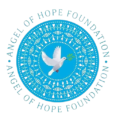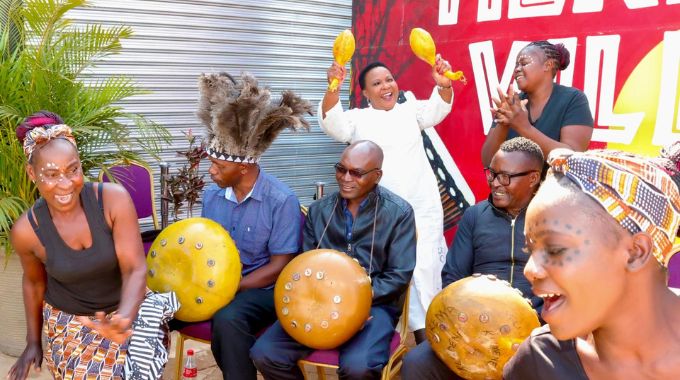Tendai Rupapa
Culture and heritage patron, First Lady Dr Auxillia Mnangagwa, has made an impassioned plea for Zimbabweans to visit the Heritage Village at the Museum of African Liberation to learn more about Zimbabwean culture, traditional norms and values and promote domestic tourism.
She made the call while touring the African Heritage Village ahead of the 44th Sadc Heads of State and Government Summit, which takes place this weekend.
The mother of the nation, who is also the patron of the Heritage Village, has a passion for the preservation of the country’s norms and traditions and has spearheaded the promotion of the national dress, traditional dishes and the return of children to the foundations of African-hood, which has inbuilt mechanisms to fight the effects of Westernisation.
On the Zimbabwean site at the Heritage Village, imposing kitchen huts have been erected and equipped with utensils that are displayed the Shona and Ndebele way, giving visitors a peek into what it really means to be Zimbabwean.
The whole place has an aura of a rural homestead, making it a village within the city.
In the two huts, there were chief wives and other women who were grinding traditional grains on a grinding stone (guyo) and brewing traditional beer commonly known as 7-days.
Also on display in the huts was dried meat from guinea fowl, rabbit, beef and goat, which was on the drying line.
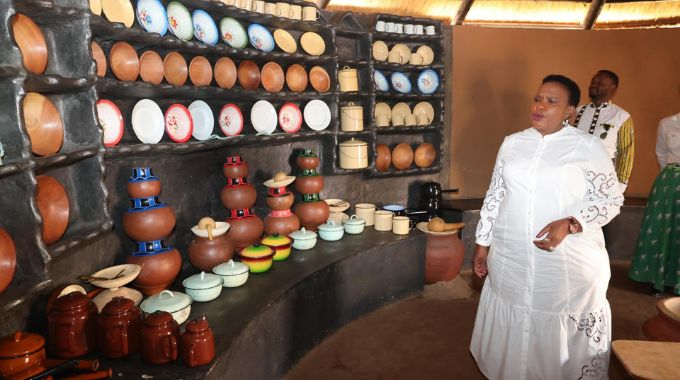
The women sat on traditional mats, while using traditional utensils in the kitchens.
It was an African themed affair as women could be seen cooking traditional dishes, while others were pounding with live traditional music in the background performed by traditional musical groups.
In appreciation of the traditional music, Dr Mnangagwa briefly joined the group and played hosho, a Zimbabwean musical instrument consisting of a pair of mapudzi gourds with seeds.
To complete the cultural village were goat pens and fowl runs and a drying place (dara) for plates, pots and other utensils.
Dr Mnangagwa ended her tour by watering a tree that she planted recently and is growing well.
In her remarks, the mother of the nation expressed delight in the progress she saw.
“When we started, we would see where things would be set and how, but now I have seen that things are in place. Although we are in town, here at the Heritage Village, we are in a rural set up. I am happy with the two kitchen huts I have seen, which symbolise different Zimbabwean cultures.
“Looking at the Sadc programme and that after the summit, the structures will remain. To Zimbabweans, I say when things of this nature happen and take place in our country, they are being done for you and me, they are being done for our families and we should embrace these facilities because the place and country are ours.
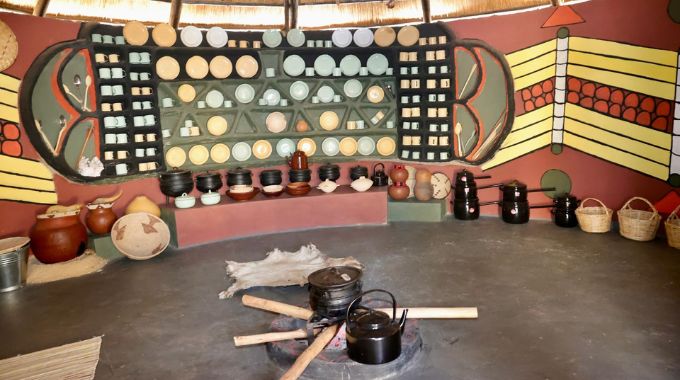
“Other countries from outside have visited us so you may not be found asking questions about this place, just like visitors, but we should know how these things are like, our traditional norms and values being displayed here.
“We should not wait for the Ministry of Tourism and Hospitality Industry to explain things around, but let’s take it upon ourselves to know what is in our country. Visitors do not look for the ministry, but they ask you and you are supposed to be knowledgeable to build our nation and ensure we contribute to this growth. I am so impressed that there are two kitchen huts here, one for the Shona and the other for the Ndebele cultures and this unites us,” she said.
The inside of the kitchens and how the Ndebele and Shona cultures arrange goods, Dr Mnangagwa noted, were different, but they use similar utensils.
“So we said this is what we respect and want to see in our country so that as a family we will be at one place. You should know the way we live, our totems and where we come from are respectable but when it comes to this as Zimbabweans we are one, we live together, we speak with one voice, we plan together.
“I am inviting women to come forward and visit this magnificent place. I know some people last visited rural areas long back, so come and see what a rural setting looks like so that where you stay you will be asking children as to what they saw and experienced at the rural setting so that children can learn.
“If you look at it, our children nowadays are all over and have been amazed by the different things that are alien to us, but we are saying this is the place where we instil our cultural values as we see such magnificent things that allow our children to learn by seeing things at the rural homestead,” she said.
Dr Mnangagwa hinted on continued use of the huts after the summit to teach children to return to their African roots and shun alien cultures.
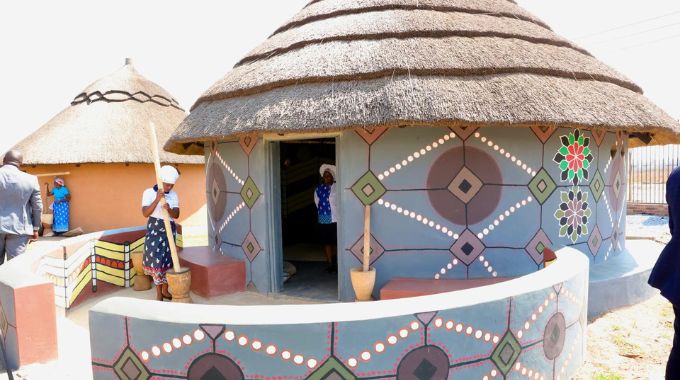
“After the summit, we want children from affluent suburbs and those from high-density suburbs to come and meet here to see whether they understand one another, speak with one voice and ask them separately as to what they will be seeing in the huts and what they would have learnt. My wish is for children to return to source and know where we came from.
“I grew up being sent into the granary by my grandmother. I am the one who could fit in the opening of the granary to measure the cupful of sorghum she needed. I am happy there is a granary here so that our children learn what it is for and the type of food stored inside,” she said.
Tourism and Hospitality Industry Minister, Barbara Rwodzi, paid tribute to the First Lady for her worthy interventions and for spearheading the preservation of the country’s norms and values.
“We are grateful to our mother for visiting this Heritage Village, which is a place that she started herself with a view to ensuring that we continue moving forward with our culture and tradition as Zimbabweans.
“She has done a lot including promoting our traditional dishes, the Nhanga/Gota/Ixhiba programme, which is teaching children norms and values countrywide. This is where these activities will be done mostly as a central place so that the whole country comes to acknowledge through seeing what is here. We thank her for the kitchen huts that have been built here.
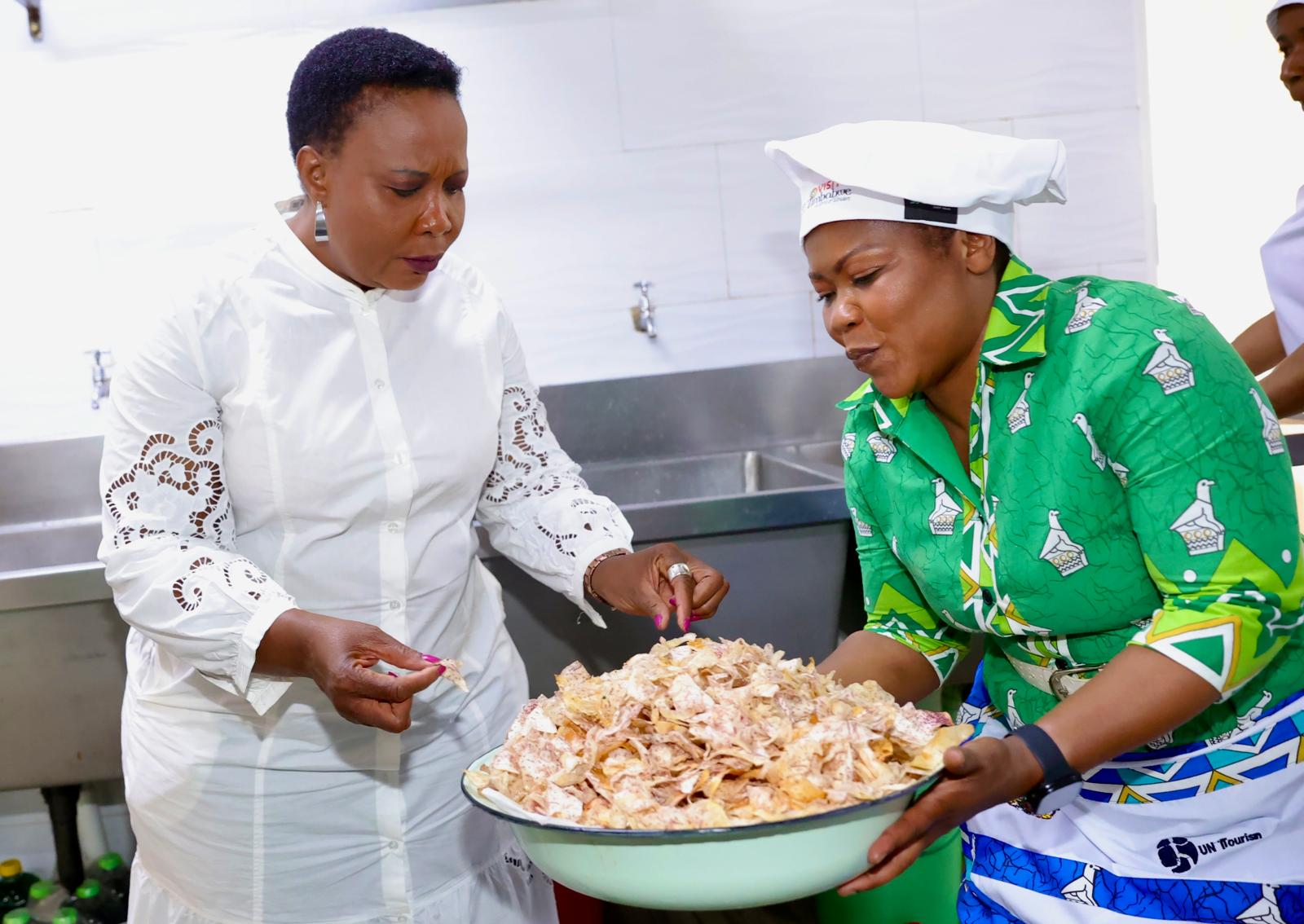
“As I stand here, I feel like I am at my rural home because of the setup, our Shona kitchen, our Ndebele kitchen, which represents our Matabeleland and Mashonaland norms. If you get in, the teachings resemble the same delivered by Amai during her Gota/Nhanga/Ixhiba sessions. She will bring along other First Ladies during the summit, showing them our culture and how we live and how she counsels children and to us this is a tourism attraction that our mother has started.
“There are some parents without rural homes who yearn for their children to appreciate what a rural home is like and for the children to know how to grind grain on (a grinding) stone, prepare sorghum sadza or how to light a fire.
“People will eat from here, which is gastronomy tourism. They will view the drawings on the walls, which tell stories about our culture and to us its domestic tourism. She will make sure we have kitchens for all nations so we encourage people to come forward and see for themselves,” the Minister said.
Institute of African Knowledge (Instak) chief executive Ambassador Kwame Muzawazi also praised the First Lady.
“We would like to thank Her Excellency, the First Lady Dr Auxillia Mnangagwa, for visiting the Heritage Village, which is housed at the museum which preserves the history of Africa. The history of Africa is not about politics alone, it is also about the history of cultural norms and values,” he said.
“There is a lot that is happening here in safeguarding our norms and values. There is a programme of treasuring our traditional cuisine. We have a programme of painters who put into perspective what happened in African history because we no longer have the pictures and some of these have no tangible evidence but we can bring them back through paintings.
“There are also designs that can be used to see how things have evolved over the years.” – Herald
